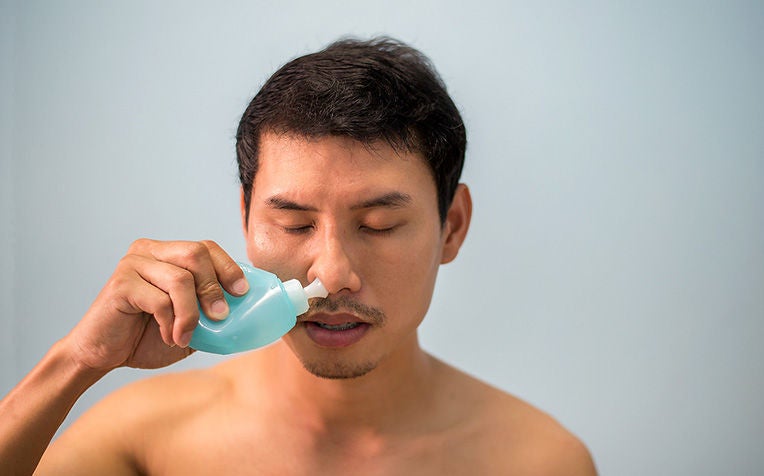HealthXchange will NEVER ask you to transfer money over a call. If in doubt, call the 24/7 ScamShield helpline at 1799, or visit the ScamShield website at www.scamshield.gov.sg.
Nasal Irrigation: Does It Help Clear Sinuses?

Nasal irrigation, which involves rinsing the nasal caivty through a warm salt solution, may be able to ease sinusitis symptoms.
Some studies show that nasal rinsing does help ease sinusitis symptoms
Nasal irrigation has its roots in the ancient Hindu practice of Ayurveda and was first reported in Western medical literature in the 1900s. Rinsing the nasal cavity by pouring a warm salt solution into the nasal passage is believed to help sinus sufferers.
The sinuses are the air-filled spaces that surround the nasal cavity as well as the area above and between the eyes. Some people are more prone to nasal congestion because of recurrent infections of the upper respiratory tract, allergies, deformities in the nose, or immune deficiencies.
Doctors typically prescribe steroids and antibiotics to treat chronic sinus sufferers. In cases where drug therapy isn’t effective, surgery can help unblock the sinuses. Surgery is also done if there are complications such as structural abnormalities or fungal sinusitis.
How nasal rinsing can help
Some sinus sufferers have turned to nasal irrigation for help with their blocked nose. It isn’t clear how nasal flushing actually works, but some believe that the rinsing action helps break up the mucus, while others think rinsing stimulates the hairs in the nasal passage to clear the mucus, say doctors from Otorhinolaryngology - Head and Neck Surgery at Singapore General Hospital (SGH), a member of the SingHealth group.
Some studies have shown that nasal rinsing does help ease sinusitis symptoms, and improvements in scan results have also been documented. The improvement in symptoms is modest in some cases, and in most studies, the patients feel better after using the rinse.
Proper care and cleaning of the irrigation bottles is essential as there is a risk of infection from contaminated bottles or solutions. Hence, it is advisable to use distilled or cooled boiled water.
The practice of nasal rinsing is generally safe although users might feel some common side effects such as a burning sensation in the nose, nasal discomfort, and tearing. At SGH, nasal rinsing can be performed on post-surgery patients as often as three times a day, said doctors, but once or twice is sufficient for other people.
Ref: O17
Check out other articles on ear, nose and throat conditions:
Allergic Rhinitis: Types, Symptoms and Treatments
Allergies and Sinusitis: What are the Differences?
Snoring and Sleep Apnea: What is the Link
7 Tips to Cope with Pet Allergies
Related Articles
Conditions & Treatments
Public Events
Get the Health Buddy App
© 2025 SingHealth Group. All Rights Reserved.


















 Get it on Google Play
Get it on Google Play